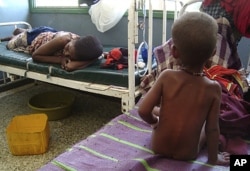The World Food Program warns that famine the conditions in Somalia could spread to other areas if aid does not get through. The organization says Somalia is the epicenter of the regional drought, which has also impacted millions in Kenya, Ethiopia, and other Horn of Africa countries.
The drought has forced hundreds of thousands of Somalis to flee their homes in search of food and water. Many have gone to camps in Mogadishu, while others have fled to crowded refugee camps in Kenya or Ethiopia.
Humanitarian organizations are responding to the food crisis with emergency airlifts. The WFP’s spokesperson in Nairobi, Challis McDonough, said as of August 1, a total of six flights have arrived in Mogadishu carrying a total of 82-tons of specialized nutritional food for malnourished children.
“It’s called Plumpy’Sup…peanuts designed to be ready to eat,” explains McDonough. “It’s a treatment specifically designed, high in protein, high in calories, high in specific vitamins, minerals, and helps severely malnourished children return to normal nutritional status.”
Usually, food supplies are brought in by ships. But McDonough said the number of malnourished children coming into Mogadishu’s nutrition centers and health clinics are rising so rapidly that existing stocks are proving insufficient.
McDonough said there is an urgent need for additional quantities of this specialized food “so we could rapidly scale up the number of children we’re able to treat.”
So far, 82 tons of food have been delivered into Mogadishu, enough to feed 28,000 children for one month. But more is still needed.
“That is roughly the number of children we will be trying to treat for malnutrition in Mogadishu, although those numbers are rising. We expect it will go up to around 30-35,000 children,” said McDonough.
Along with making sure the critically malnourished children are fed, McDonough said it is making sure families also get food rations.
“When a child is malnourished they are most likely coming from a family situation. We have to make sure that the family has enough to eat so they aren’t tempted to share the child’s ration. The malnourished child is in critical need of their full ration,” she noted.
Other parts of the Horn are also being hit with the food crisis. In Ethiopia for example, McDonough said more than four million people are in need of food assistance.
The drought has also affected pastoralist communities there. “In some areas it is one of the driest seasons in 60 years and livestock have been dying,” said McDonough.
Livestock not only provide food for the region but they also provide a livelihood for millions and loss of livestock also means loss of income.





